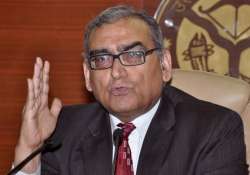Former Press Council of India (PCI) chairman Markandey Katju has come down heavily on Chief Justice of India (CJI) TS Thakur over the latter’s complaints on the large number of vacancies in the High Courts.
Katju, a former Supreme Court judge himself, has chided the Chief Justice of India for not talking about the rampant corruption in the judiciary.
In a blog published today, Katju highlighted former law minister Shanti Bhushan’s affidavit, filed many years back in the top court stating that half of the previous 16 CJIs were “definitely corrupt”.
“Since then there have been more CJIs about whose integrity there were grave question marks. Justice Bharucha, a former CJI, said in the year 2000 or so that 20 per cent of the High Court judges are corrupt, and since then the percentage has probably doubled. As regards the subordinate judiciary things are far worse,” his blog reads.
Katju’s reaction came a day after Justice Thakur expressed his disappointment at Prime Minister Narendra Modi’s Independence Day speech, saying he was hoping that there would be a “mention on appointment of judges in his address”.
“It is true that there are many vacancies in the High Courts. But the deadlock cannot be broken by the confrontationist approach Justice Thakur has adopted,” Katju writes.
“In less than an hour of the Prime Minister's speech from Red Fort, Justice Thakur in his address at the Supreme Court flag hoisting, expressed his disapproval of the Prime Minister's speech as he felt the content fell far short of his expectation. Did Justice Thakur expect the Prime Minister to talk of the differences between the Supreme Court and the Government of India from the ramparts of the Red Fort?”
He further lashed out at Justice Thakur for heading the bench that recently passed an order on implementation of the Justice Lodha committee recommendations in the BCCI.
Katju said that Justice Thakur should not hear the cricketing body’s review petition against the judgment since the CJI was bound to dismiss it. He claimed that Justice Thakur had ignored several precedents set by the larger benches in deciding the BCCI case.
“Of late Justice Thakur seems to have lost his balance. His BCCI order, in which he ignored dozens of binding precedents which said that judges cannot legislate shows he has no respect for judicial discipline and self restraint,” Katju writes.
On Justice Thakur’s remark on appointment and transfer of High Court Judges, Katju writes: “His statement that he may consider withdrawing judicial work from High Court judges who were recommended to be transferred shows his ignorance of the fact that allotment of work ( or not allotting it ) is to be done under our Constitutional scheme by the Chief Justice of the High Court, not the CJI. Under our Constitutional scheme, while High Courts have administrative control over the lower judiciary ( vide Articles 227 and 235 ), the Supreme Court has no administrative control over the High Courts. High Courts under our Constitutional scheme are administratively autonomous, though on the judicial side appeals against their orders can go to the Supreme Court.”
“What Justice Thakur has forgotten is that decisions at the highest level are to be reached by consensus, by the CJI and the government representatives sitting in a room and coolly discussing the matter, and not by one organ flexing its muscles at another, or by the CJI giving confrontationist open speeches which play to the galleries and receive popular applause and cheers,” he further writes.
On CJI’s idea of courts working during vacations, Katju said, “Justice Thakur said that judges should work during summer vacations and clear the backlog, but he himself went abroad twice during the last summer vacations. He directed that no Delhi judicial officer should go abroad even if he is on leave, but evidently he has exempted himself from this rule 'Par upadesh kushal bahutere'”.
Latest India News
